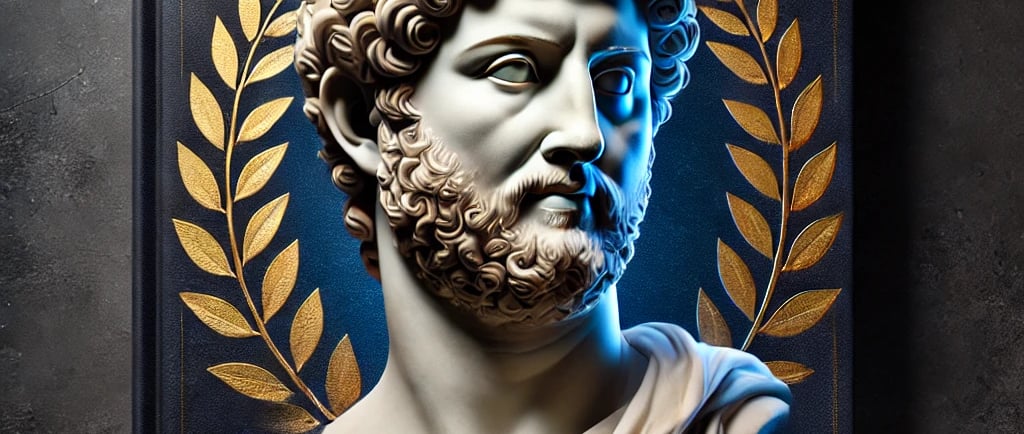Marcus Aurelius: The Philosopher-Emperor and His Timeless Guide to Personal Growth
Marcus Aurelius, the 16th Emperor of Rome, was a philosopher-king whose Meditations offer timeless wisdom on resilience, self-discipline, and inner peace. His Stoic philosophy teaches us to control our mindset, embrace challenges, and live with virtue. In today’s chaotic world, his insights remain a powerful guide for personal growth and leadership. Start your Stoic journey today with Meditations! 🚀
BC
3/6/20254 min read


Introduction: The Enduring Wisdom of Marcus Aurelius
Few historical figures combine power, wisdom, and introspection as profoundly as Marcus Aurelius, the 16th Emperor of Rome (161–180 CE). Known as the last of the Five Good Emperors, Marcus was more than a ruler, he was a philosopher, warrior, and seeker of wisdom, whose writings continue to inspire millions worldwide.
His masterpiece, Meditations, is not just a book; it is a manual for resilience, self-discipline, and inner peace. Written during his military campaigns, Meditations serves as a guide for navigating adversity, controlling emotions, and living with purpose and integrity.
But why do his insights remain relevant today? How can his philosophy help modern individuals overcome stress, uncertainty, and personal struggles?
In this article, we will:
✔ Dive into the life of Marcus Aurelius – His journey from student to emperor.
✔ Explore his powerful writings – What makes Meditations an essential read.
✔ Apply his wisdom to personal growth – How Stoic principles can improve your life today.
If you're searching for timeless strategies to build resilience, clarity, and wisdom, keep reading—Marcus Aurelius may just change the way you see the world.
1. The Life of Marcus Aurelius: From Philosopher to Emperor
Early Life and Education: A Student of Wisdom
Born on April 26, 121 CE, Marcus Aurelius was raised in a wealthy and politically influential family in Rome. However, unlike many aristocrats of his time, he was not drawn to luxury or excess. Instead, he had a deep love for philosophy, ethics, and knowledge.
His education was exceptional. He studied under some of the greatest Stoic and Platonic philosophers, including:
Junius Rusticus – Introduced him to Epictetus' teachings and shaped his Stoic mindset.
Claudius Maximus – Taught him discipline, duty, and leadership.
Fronto – Trained him in rhetoric and communication.
At just 17 years old, Marcus was adopted by Emperor Antoninus Pius, who trained him to be the next leader of Rome. Instead of indulging in power, Marcus continued his philosophical reflections, preparing himself for a life of responsibility and service.
Marcus Aurelius as Emperor: Leading Through Adversity
When Marcus Aurelius became emperor in 161 CE, he inherited a world of chaos. His reign was marked by:
⚔ Wars on multiple fronts – The Marcomannic Wars against invading Germanic tribes.
☠ A devastating pandemic – The Antonine Plague, which killed millions.
⚖ Political instability – Corruption, conspiracies, and betrayals within the Roman Senate.
Despite these challenges, Marcus remained calm, rational, and focused on justice. He personally led his troops into battle, proving that he was not just a ruler, but a true leader.
Yet, in the midst of war and uncertainty, he turned inward—writing what would become one of history’s greatest philosophical works: Meditations.
2. Meditations: The Personal Diary of a Stoic Emperor
Unlike most Roman rulers, Marcus Aurelius did not write military strategies or political doctrines. Instead, he wrote for himself—a collection of private reflections on how to live with virtue, resilience, and wisdom.
Key Teachings from Meditations >
1. Control What You Can, Accept What You Can’t
Marcus teaches that happiness depends on how we respond to life’s challenges, not on external events.
"You have power over your mind, not outside events. Realize this, and you will find strength."
💡 Application Today:
Instead of worrying about things you can’t change, focus on your mindset, actions, and choices.
Practice letting go of unnecessary stress and anxiety.
2. Live According to Virtue
For Marcus, the ultimate goal of life was to act with wisdom, courage, justice, and discipline.
"Waste no more time arguing about what a good man should be. Be one."
💡 Application Today:
Act with integrity in all areas of life—career, relationships, and personal growth.
Develop good habits that align with your values.
3. Death is Natural—Don’t Fear It
Unlike most people, Marcus embraced mortality, seeing it as a natural part of life.
"It is not death that a man should fear, but he should fear never beginning to live."
💡 Application Today:
Stop postponing your dreams—start living with purpose now.
Focus on what truly matters, rather than temporary pleasures or material things.
4. Happiness Comes from Within, Not External Success
Marcus warns against chasing fame, fortune, or validation from others.
"The happiness of your life depends upon the quality of your thoughts."
💡 Application Today:
Instead of seeking happiness in possessions or achievements, cultivate gratitude and inner peace.
Practice mindfulness and presence in your daily life.
3. How Marcus Aurelius’ Philosophy Can Transform Your Life
The Stoic principles Marcus Aurelius practiced are not just ancient wisdom—they are powerful tools for modern living.
How Meditations Can Help You Today
✅ Building Resilience – Overcome stress, setbacks, and uncertainty with mental strength.
✅ Developing Leadership Skills – Lead with calmness, wisdom, and fairness.
✅ Managing Emotions – Learn to control anger, anxiety, and fear.
✅ Finding Purpose – Align your life with what truly matters.
✅ Practicing Gratitude – Appreciate the present moment rather than chasing external success.
Many of history’s greatest leaders and thinkers have applied Stoic principles, including:
✔ Theodore Roosevelt – Used Stoicism to overcome hardship and adversity.
✔ Nelson Mandela – Maintained inner peace and discipline during 27 years in prison.
✔ Warren Buffett – Embodies Stoic patience and self-control in investing.
If Marcus Aurelius could lead the Roman Empire through war and crisis, imagine how his wisdom can help you navigate your own challenges.
4. Conclusion: Why You Should Read Meditations
Marcus Aurelius was not just an emperor—he was a seeker of truth, a teacher of virtue, and a master of self-discipline. His writings are not ancient history, but a roadmap for modern life.
📖 Why You Should Read Meditations:
✔ Gain mental clarity and emotional resilience.
✔ Find peace in difficult times.
✔ Learn how to lead with wisdom and integrity.
✔ Discover the secrets to true happiness and fulfillment.
At a time when the world is filled with distractions, stress, and uncertainty, the wisdom of Marcus Aurelius is more relevant than ever.
Start Your Journey with Marcus Aurelius Today!
Ready to apply Stoic wisdom to your life? Get your copy of Marcus Aurelius’ Meditations now at CenturiesPublisher.com and unlock the power of self-mastery, resilience, and true happiness.
✔ Exclusive editions
✔ Modern commentary and insights
✔ Timeless wisdom for everyday life
👉 Transform your life—Start reading Meditations today! 🚀
Get Previews & News
© 2025. All rights reserved.


